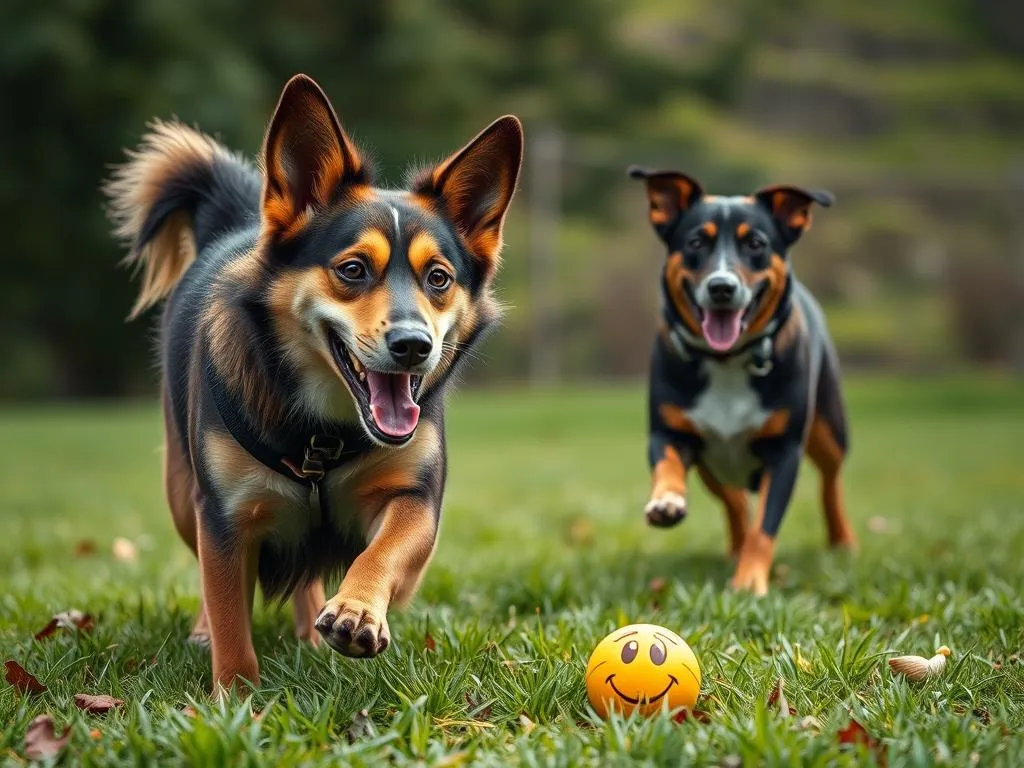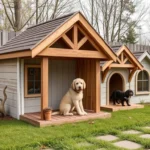
Introduction
The joy of outdoor play is not just limited to humans; our furry companions thrive on it too. Outdoor games for dogs offer a myriad of benefits that contribute to their overall well-being. Engaging in physical activity helps maintain a healthy weight, enhances cardiovascular health, and develops muscle strength and joint flexibility. Moreover, outdoor play is crucial for mental stimulation, helping to reduce boredom and prevent destructive behavior.
Additionally, these activities foster a deeper bond between pet and owner. When you play together, you’re not just exercising your dog; you’re also creating cherished memories that strengthen your relationship. In this article, we’ll explore various outdoor games for dogs, their benefits, and how to ensure a safe and engaging playtime experience.
Benefits of Outdoor Games for Dogs
Physical Health Benefits
Physical activity is essential for maintaining a dog’s health. Regular outdoor games can help in the following ways:
-
Improved Fitness and Weight Management: Just like humans, dogs need exercise to manage their weight. Regular play helps burn calories and maintain a healthy body condition.
-
Enhanced Cardiovascular Health: Activities that get your dog moving promote heart health and overall endurance, reducing the risk of heart-related diseases.
-
Muscle Development and Joint Flexibility: Engaging in different games helps to build strong muscles and maintain joint flexibility, which is especially crucial as dogs age.
Mental Stimulation
Outdoor play is not just about physical benefits; it also plays a vital role in mental well-being:
-
Reducing Boredom and Destructive Behavior: Dogs that don’t get enough mental stimulation can become bored, leading to destructive behaviors. Engaging outdoor games keep their minds active.
-
Encouraging Problem-Solving Skills: Many outdoor games require dogs to think critically, enhancing their problem-solving abilities and keeping their minds sharp.
Socialization Opportunities
Outdoor games provide excellent opportunities for dogs to socialize:
-
Interacting with Other Dogs and People: Regular playtime in parks or dog-friendly areas allows dogs to meet and interact with other dogs and their owners, enhancing their social skills.
-
Building Confidence in Different Environments: Exposure to various settings and situations can help dogs become more confident and less anxious in new environments.
Types of Outdoor Games for Dogs
Fetch
One of the most popular outdoor games for dogs is fetch. It’s simple yet effective:
-
Description of the Game: The classic game of fetch involves throwing an object (like a ball or frisbee) and encouraging your dog to retrieve it.
-
Variations: You can mix it up with frisbees, tennis balls, or even sticks. Each provides a different level of challenge and excitement.
-
Tips for Effective Play: To enhance the game, consider using a ball launcher, which can throw the ball farther than you can, keeping your dog engaged for longer.
Agility Courses
Agility training can be a fun and rewarding way to challenge your dog:
-
Overview of Agility Training: This type of training involves navigating a course with various obstacles, which can improve your dog’s coordination and focus.
-
DIY Agility Course Ideas: You can create a simple agility course in your backyard using items like cones, hula hoops, and tunnels made from cardboard boxes.
Hide and Seek
This game is not just for kids; dogs love it too:
-
How to Play with Your Dog: Have your dog sit and stay while you hide somewhere in your yard or home. Once hidden, call your dog and reward them when they find you.
-
Benefits of This Game: This game engages your dog’s natural hunting instincts and provides mental stimulation.
Tug-of-War
A classic game that can be great fun when played safely:
-
Importance of Rules: Establish clear rules before starting, such as letting go when you say “drop it.” This helps maintain control and prevents aggressive behavior.
-
Recommended Toys for the Game: Use sturdy tug toys made of rope or rubber to ensure safety while playing.
Obstacle Courses
Setting up an obstacle course can be a fun way to keep your dog active:
-
Setting Up a Simple Obstacle Course: Use items like chairs, cones, and tunnels to create a challenging course for your dog to navigate.
-
Variations and Challenges: Change the course layout regularly to keep things fresh and exciting for your dog.
Safety Precautions
While outdoor play is fun, safety should always be a priority.
Choosing a Safe Play Area
-
Importance of a Secure, Fenced-In Area: Always choose a location that is secure and free from distractions that might cause your dog to run off.
-
Avoiding Hazardous Materials and Dangerous Terrain: Make sure the play area is free from sharp objects, toxic plants, or uneven ground that could cause injury.
Weather Considerations
-
Tips for Playing in Extreme Heat or Cold: On hot days, play during the cooler parts of the day, and always provide access to fresh water. In cold weather, limit playtime to prevent hypothermia.
-
Recognizing Signs of Overheating in Dogs: Be vigilant for signs of overheating, such as excessive panting, drooling, or lethargy.
Supervision and Interaction
-
Importance of Keeping a Close Eye on Your Dog: Always supervise your dog during play to ensure they’re safe and not engaging in risky behavior.
-
Encouraging Safe Play with Other Dogs and Pets: If playing with other dogs, monitor their interactions to prevent aggressive behavior and ensure everyone is having fun.
Engaging Games for Different Dog Breeds and Ages
Active Breeds
Certain breeds require more exercise and stimulation:
- Recommended Games for High-Energy Breeds: Breeds like Border Collies and Retrievers thrive on games like fetch and agility training that challenge their physical and mental limits.
Older Dogs
As dogs age, their exercise needs change:
- Gentle Games and Modifications for Senior Dogs: Opt for gentler versions of games, like slower-paced fetch or short hide and seek sessions.
Small Breeds
Small dogs may require different games:
- Suitable Outdoor Games for Small Dog Breeds: Activities like mini agility courses and gentle tug-of-war can be great for smaller breeds, allowing them to play without overstretching themselves.
Puppies
Puppies have unique needs that should be considered:
- Age-Appropriate Games: Focus on games that encourage socialization, such as gentle fetch with soft toys, and activities that promote basic command training.
Training through Play
Playtime is not just for fun; it can also be a valuable training tool.
Incorporating Commands into Games
- Teaching Basic Commands During Fetch or Hide and Seek: Use these games to reinforce commands like “sit,” “stay,” and “come” while your dog is engaged and excited.
Positive Reinforcement Techniques
- Using Treats and Praise to Encourage Good Behavior: Reward your dog with treats or verbal praise during and after games to reinforce positive behavior and obedience.
Behavioral Training through Games
- How Games Can Help with Leash Training and Recall: Incorporate recall training during play to strengthen your dog’s response to being called, enhancing safety during outdoor adventures.
DIY Outdoor Games and Toys
Creating your own games and toys can be a fun and cost-effective way to engage your dog.
Homemade Toys
- Simple Recipes for Creating Dog Toys from Household Items: Use old t-shirts or socks to create knotted toys for tug-of-war, or fill a plastic bottle with treats for a DIY puzzle toy.
Crafting Outdoor Games
- Instructions for Building DIY Agility Equipment: Use PVC pipes to create jumps or weave poles, providing a fun and challenging course for your dog.
Using Natural Resources
- Ideas for Games Incorporating Sticks, Leaves, and Other Natural Elements: Take advantage of the natural environment by playing games that involve fetching sticks or hiding treats in leaves for a scavenger hunt.
Conclusion
Engaging in outdoor games for dogs not only promotes physical health and mental stimulation but also strengthens the bond between you and your furry friend. By incorporating a variety of games tailored to your dog’s needs and abilities, you can ensure that playtime is both fun and beneficial.
Encouraging regular outdoor play will lead to a happier, healthier, and more engaged pet. So, grab a ball, set up an agility course, or play a round of hide and seek—your dog will thank you for it!









